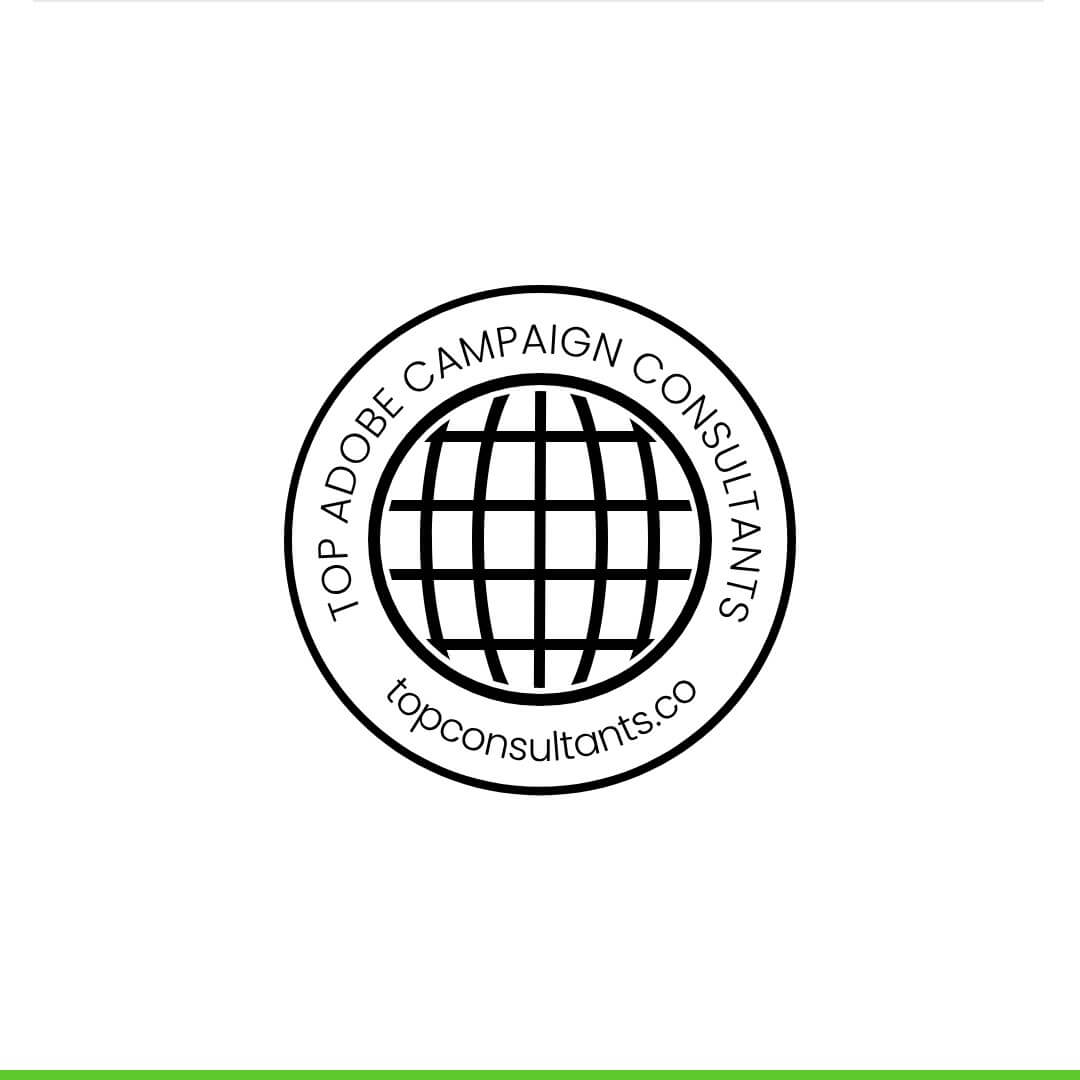Expert Adobe Campaign consulting, migration, and managed services. Hire certified partners to optimize automation, integration, and ROI.
-
Royal Cyber
Naperville, Illinois, USA
610Loading... -
Viseven
Tallinn, Estonia
594Loading... -
Verticurl
Singapore, Singapore
486Loading... -
Hero Digital
San Francisco, California, USA
481Loading... -
Cognizant Netcentric
Zürich, Switzerland, Switzerland
481Loading... -
MarketOne
Waltham, Massachusetts, USA
474Loading... -
Blend360
Columbia, Maryland, USA
470Loading... -
Bounteous
Chicago, Illinois, USA
422Loading... -
BORN Group
New York, NY, USA
377Loading... -
Digitas
Boston, Massachusetts, USA
376Loading... -
ABeam Consulting
Tokyo, Japan
374Loading... -
Lutech
Cinisello Balsamo, Milano, Italy
362Loading... -
Gorilla Group
Chicago, Illinois, USA
343Loading... -
VASS
Alcobendas, Madrid, Spain
341Loading... -
dotSource
Jena, Germany
324Loading... -
Tekno Point/DEPT
Mumbai, Maharashtra, India
321Loading... -
QBurst
Chantilly, Virginia, USA
305Loading... -
Customer Centria
Mumbai, Maharastra, India
289Loading... -
Blue Acorn iCi
Charleston, South Carolina, USA
289Loading... -
Innova-tsn
Madrid, Spain
289Loading... -
VILT
Lisbon, Portugal
282Loading... -
Youwe
Rotterdam, South Holland, Netherlands
281Loading... -
Ensemble
Vancouver, British Columbia, Canada
243Loading... -
MRM
New York, NY, USA
236Loading... -
Webjump
São Paulo, Brazil
201Loading... -
Telekom MMS
Dresden, Saxony, Germany
194Loading... -
Omni.Pro
Miami, Florida, USA
193Loading... -
Reply
Turin, Italy
185Loading... -
BitBang
Bologna, Italy
174Loading... -
Perficient
St. Louis, Missouri, USA
164Loading... -
Indegene
Princeton, New Jersey, USA
153Loading... -
Avaus
Helsinki, Finland, Finland
140Loading... -
Valtech
London, England, UK
137Loading... -
Axeno
Noida, Uttar Pradesh, India
131Loading... -
Sii Poland
Warsaw, Poland
122Loading... -
Datacom
Auckland, New Zealand
120Loading... -
Merkle
Columbia, Maryland, USA
117Loading... -
Media.Monks
Hilversum, Netherlands, Netherlands
116Loading... -
Wunderman Thompson
New York, NY, USA
112Loading... -
Cybage
Pune, Maharashtra, India
111Loading... -
Epsilon
Irving, Texas, USA
111Loading... -
Slalom
Seattle, Washington, USA
109Loading... -
Protiviti
Menlo Park, California, USA
109Loading... -
Zensar
Pune, Maharashtra, India
107Loading... -
eClerx
Mumbai, Maharashtra, India
107Loading... -
Virtusa
Southborough, Massachusetts , USA
106Loading... -
CDW
Vernon Hills, Illinois, USA
106Loading... -
Publicis Sapient
Boston, Massachusetts, USA
105Loading... -
WillowTree
Charlottesville, VA, USA
105Loading... -
Publicis Groupe
Paris, France, France
104Loading... -
Interpublic Group
New York, NY, USA
104Loading... -
WPP
London, England, UK
103Loading... -
EPAM
Newtown, Pennsylvania, USA
103Loading... -
NextRow Digital
Schaumburg, Illinois, USA
103Loading... -
Capgemini
Paris, France, France
102Loading... -
PwC
London, England, UK
102Loading... -
HCLTech
Noida, Uttar Pradesh, India
102Loading... -
Tech Mahindra
Pune, Maharashtra, India
102Loading... -
LTIMindtree
Mumbai, Maharashtra, India
102Loading... -
RightWave
San Jose, California, USA
102Loading... -
Wipro
Bangalore, Karnataka, India
101Loading... -
IBM
New York, NY, USA
101Loading... -
Infosys
Bangalore, Karnataka, India
101Loading... -
Tata Consultancy Services
Mumbai, Maharashtra, India
101Loading... -
Accenture
Dublin, Ireland, Ireland
100Loading... -
Deloitte
London, England, UK
100Loading... -
EY
London, England, UK
100Loading... -
The Pedowitz Group
Milton, Georgia, USA
99Loading... -
Conexio
Montevideo, Uruguay
95Loading... -
Balance
Southbank, Victoria, Australia
88Loading... -
The Lumery
Melbourne , Victoria, Australia
80Loading... -
LeapPoint
Reston, Virginia, USA
76Loading... -
CLEARGOALS
New York, NY, USA
69Loading... -
Axamit
Montreal, Quebec, Canada
61Loading... -
18th DigiTech
Noida, Uttar Pradesh, USA
58Loading... -
IntoAction
Best, North Brabant, Netherlands
57Loading... -
Lima Consulting Group
Malvern, Pennsylvania, USA
51Loading... -
Etumos
Seattle, Washington, USA
44Loading... -
TAP CXM
London, UK
42Loading... -
LeadFabric
Brussels, Belgium, USA
39Loading... -
DemandLab
Jenkintown, Pennsylvania, USA
30Loading... -
iDA
Kontich, Vlaanderen, Belgium
29Loading... -
Thought Leader Systems
Hattersheim am Main, Hessen , Germany
29Loading... -
Trezo
Blumenau, Santa Catarina, Brazil
27Loading... -
Leadous
Edina, Minnesota, USA
21Loading... -
BeBold
Antwerp, Flemish Region, Belgium
18Loading... -
webalyse
Zug, Switzerland
16Loading... -
Lutech Basiliko
Modena, Italy
15Loading... -
Attribute Data
Singapore, Singapore
15Loading... -
PiSrc
New York, NY, USA
10Loading...


